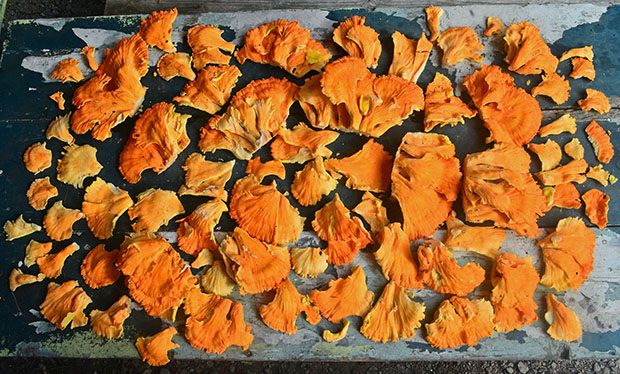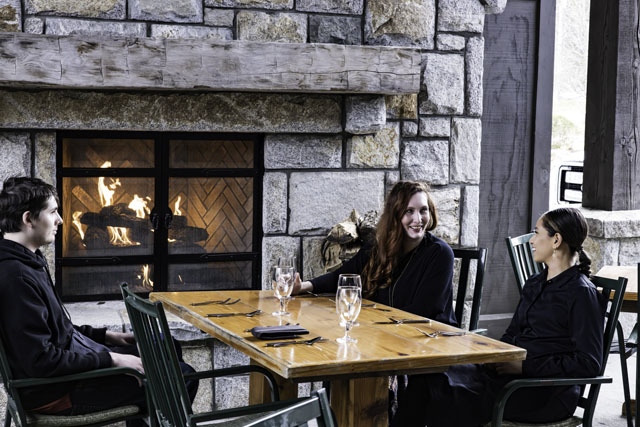Mushroom Mountain
03 Jun 2020
A local farm focused on regenerative farming and safe foraging
By ALLISON BOLT

Highlands, NC gets an average of 81 inches of rain each year, making it ideal for the growth of a great variety of wild mushrooms. However, knowing which mushroom varieties are edible and which are poisonous takes years of studying mycology. Luckily, there is a place where locals and visitors alike can learn about and enjoy native wild mushrooms, foraging and sustainable agriculture.
Tucked away in Little Scaly Mountain at The Mountain Retreat and Learning Center is the Many Hands Peace Farm (MHPF) that focuses on foraging and mushrooms. The Mountain was founded in 1979 by a group of friends and Unitarian Universalists as an ecologically conscious retreat and learning center serving congregations, businesses, schools and community groups.
In 2010, The Mountain created the MHPF to grow food for guests as well as educate summer campers and adult groups on sustainable agriculture practices and foraging. The farm offers workshops, forest-to-table dinners, foraging tours, apprenticeships and sustainable agriculture education. The farm produces vegetables, mushrooms, flowers, herbs, handmade mountain goods and fresh eggs that can all be purchased at both the Highlands and the Cashiers farmers’ markets.
The farm is completely organic and doesn’t use synthetic fertilizers, herbicides, pesticides, etc. Joey Kyle, Manager of MHPF, describes the farm’s practices as regenerative agriculture. “We’re here to share,” said Kyle. “We’re not subsistence farmers. The Mountain gives us a space to explore, try experimental crops and techniques, and sometimes fail with grace. We are here to show what’s possible and put good environmental stewardship into practice for others to see.”
Kyle has an extensive background in mycology and foraging as well as a passion for sharing and educating the public on native wild mushrooms. He began his mycology journey studying Animal Behavior in college but soon switched to Environmental Studies after falling in love with agriculture. Not long after, he could be found growing King Oyster mushrooms in his college dorm room and farming internationally.
Kyle was once one of The Mountain’s summer camp students while in high school. At the camp, he found a passion for studying the area’s ecology so it was only fitting that he would later return to attend the apprenticeship program. During his apprenticeship, he learned more about farming skills in Western North Carolina, growing organic produce, experiential education techniques, and of course, wild plant and mushroom identification. “The first day I arrived to start my apprenticeship on the farm was mid-August, and it must have just rained,” said Kyle. “I walked the trail up to the top of The Mountain and photographed at least 30 mushroom species in a half-hour.”
Since that day in mid-August, Kyle has become the Manager of MHPF, is certified to sell over 20 species of wild mushrooms and has continued to go on foraging hikes while also educating the public on mushroom varieties and foraging. On one of his favorite hikes, he found a 10-pound Hen of the Woods or Grifola Frondosa. “It made me realize that I can go out for a beautiful hike, keep my eyes peeled, and I might be able to bring home a $200 mushroom that tastes divine and share it with friends, family and guests at The Mountain,” Kyle said.
When it comes to safe and successful foraging, Kyle has a few tips. The number one most important tip is to always be 100 percent sure about your identification of an edible species. Only rely on the help of experts when identifying a wild mushroom. He suggests referencing the book “A Field Guide to Mushrooms of the Carolinas” by Alan E. Bessette and Arleen R. Bessette. There are two lethal native mushrooms in the area and multiple poisonous species that the public should become aware of. Always cut mushrooms at the base instead of pulling them so they can reproduce. “You don’t need to feel guilty about picking mushrooms,” said Kyle. “They are just the apple on the tree, and you’re leaving most of the organism in peace.” Always cook mushrooms before eating them. “Most people don’t have the proper enzymes to digest the chitin in the cell walls of fungi without cooking the mushrooms first,” said Kyle.
Finally, Kyle’s last tip, “there’s the phrase: there are old mushroom hunters, there are bold mushroom hunters, but there are no old, bold mushroom hunters.” However, if you practice safe foraging with the help of the experts at MHPF, “mushroom hunting can be an exciting addition to your hiking, supplement your diet and income, and increase your overall awareness in nature.”













